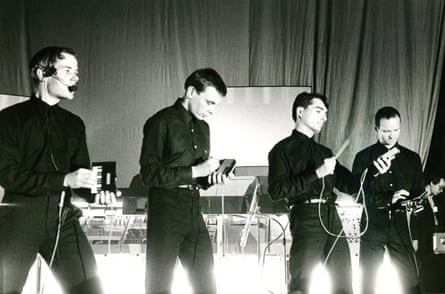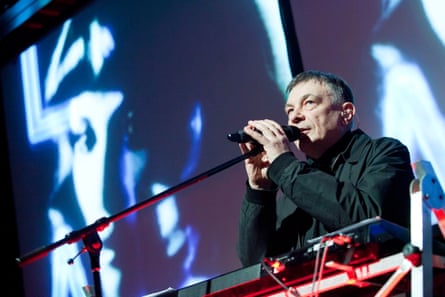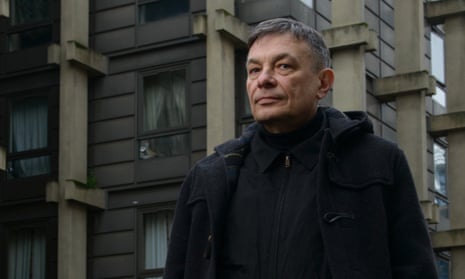When a teenage Karl Bartos told his parents that he wanted to dedicate his life to music, his father was so furious that he kicked his son’s acoustic guitar to pieces.
After hearing the Beatles at 12, something had awakened in him – “I wanted to feel like how they sounded,” he says – and so he persisted past that smashed guitar. Tripping on LSD listening to Hendrix was another portal. “The music spoke to me in all the world’s languages at once,” he recalls in his memoir. “I understood its message down to the very last frequency. Never before had the essence of music been as clear.”
The memoir, The Sound of the Machine: My Life in Kraftwerk and Beyond, is an incredibly detailed book about Bartos’s life: from those pivotal childhood moments, years spent at the Robert Schumann Conservatory in Dusseldorf where he studied percussion, through to his time in what is considered the classic Kraftwerk line-up – Bartos, Ralf Hütter, Florian Schneider, Wolfgang Flür – in which he played from 1974 until 1990.
Kraftwerk were looking for a percussionist for some live dates and Bartos was recommended by his professor. Being summoned to their infamous and secretive Kling Klang Studio, he immediately clicked with Hütter and Schneider. “We were attracted to each other and it just felt pure,” he recalls. “I knew from the first meeting it was something very special.”

Ralf Hütter, Karl Bartos, Wolfgang Flür, Florian Schneider. Photograph: Gie Knaeps/Getty Images
Bartos joining coincided with the release of Autobahn, a record – specifically its title track – often considered a benchmark for modernity in pop music, with its pulsing groove stretching out into the future. Work soon commenced on concept album Radio-Activity, and Bartos became more of an embedded member, contributor and co-writer. The subsequent albums Trans-Europe Express, The Man-Machine and Computer World (1977-1981) are an immaculate, peerless run of records that shimmer and glisten with metallic sparkle; equal parts meticulous pop and futuristic sci-fi soundscapes, they became the blueprint for electronic pop in the ensuing decade. Bartos says Kraftwerk’s mission was to invest technology with humanity, to make it “feel-able and visible – and this was different to all the electronic pop music which was inspired by us. They just treated the electronic equipment like a guitar; they just played songs in the tradition of English pop music. But Kraftwerk remained different because we wanted to make people aware of technique.”
Not only were the band climbing consistent creative peaks in the studio but their dynamic was at its most friendly and sociable. Some were living together in a place that housed what Bartos describes as “legendary parties”, though he won’t be drawn on juicy details. For those we must instead turn to Flür’s memoir I Was A Robot. “A Super 8 projector would be playing sex films on to the wall next to the bathtub,” he wrote. “Everything would be covered in bubble bath and red wine, and candlelight would dimly illuminate the sweaty scene. These parties were like Sodom and Gomorrah.” It seems at odds with such a mysterious and secretive band who were experimenting with using robot aliases – and Bartos’s book plays to type by focusing intensely on working methods, creative process and technology.
In 1981 they successfully toured – despite their equipment weighing seven tonnes – and had a UK No 1 the next year with The Model. They were at their creative and commercial zenith, with Bartos writing that Computer World “was our most successful attempt at translating the dialect of the man-machine metaphor into music”, but Kraftwerk wouldn’t perform live for nearly a decade as they disappeared into the studio. “We slept over the whole 80s,” Bartos says. “It really was a dramatically huge mistake.”
The next album, 1986’s Electric Café, was a drastic shift. “The problem started when the computer arrived in the studio,” says Bartos. “A computer has nothing to do with creativity, it’s just a tool, but we outsourced creativity to the computer. We forgot about the centre of what we were. We lost our physical feeling, no longer looking each other in the eye, only staring at the monitor. At the time, I thought innovation and progress were synonyms. I can’t be so sure anymore.”
It turns out this member of a group who heralded a new era of futuristic technology-heavy music is something of a techno-sceptic, but Bartos stresses that the era most people associate as peak Kraftwerk was produced by a largely analogue band. They were pushing the limits of primitive technology to its absolute limit, and for Bartos, these limitations sparked innovation. But when presented with endless options, there wasn’t anything to rub up against, only a limitless horizon. “We stopped being creative because we were solving problems,” he says.
The pace of work slowed significantly. Hütter’s new obsession with cycling became a priority and studio sessions were often a few half-hearted hours in the evening. Plus, they had become obsessed with other people’s records, frequently taking trips to discos to play early mixes of their tracks to see how they sounded against fresh cuts of the day. They began to chase the zeitgeist rather than setting it. Upon hearing New Order’s Blue Monday, they were so impressed they sought out its sound engineer, Michael Johnson, and flew to the UK to have him mix Tour de France – a standalone single from 1983 – but chose never to release that version.
“Things started to look more and more desolate,” Bartos says. “Instead of remembering how our most authentic, and successful, music had been made, we fixed our gaze on the mass-market music zeitgeist. But comparing our own ideas to other people’s work was anti-creative and counterproductive. We became music designers, manufacturing consumer music oriented only towards winning against other contestants. Our imagination lost its autonomy. It seemed like we’d forgotten how our music had come about in the first place.”
Flür lost patience and left to pursue furniture-making and Bartos prepared an exit too, with mounting issues around songwriting credits and payments, as well as a refusal to tour, also being an issue. “It was a complete nightmare,” he says of that time. Although typical of Hütter and Schneider’s detached approach at this point, there was little in the way of response or drama when he did finally leave in 1990.
It began a period in which he felt “very low” but he soon started to work with Orchestral Manoeuvres in the Dark’s Andy McCluskey, writing songs together, as well as collaborating with Bernard Sumner and Johnny Marr’s side project Electronic on their second album. “They saved my life,” he reflects. “Because I knew I was not alone.”

McCluskey recalls Bartos expressing an interest in working together as being like “one of the 12 disciples inviting you to join their gang.” Bartos even had a helping hand in McCluskey creating girl band Atomic Kitten. “I was going to retire but I was conceited enough to think I could still write songs,” McCluskey recalls. “Karl said, ‘don’t just give them to the publishing company because they’ll mess you around and you’ll be a songwriting whore’. He said, ‘why don’t you create a vehicle for your songs?’ So I’ve always delighted in saying to people: ‘yeah, Kraftwerk created Atomic Kitten.’” Bartos also released two albums as Elektric Music in the 1990s, before releasing two solo albums in 2003 and 2013. Kraftwerk, meanwhile, had a stellar return to recording with Tour De France Soundtracks in 2003, and – now with Hütter the only original member – have long toured a 3D live show.
Reflecting on Kraftwerk today, he doesn’t come across as bitter, more disappointed at what could have been, lamenting wasted time, creative energy and the decade-shaped hole where they could have been electrifying audiences with prescient yet era-defining music. That said, he doesn’t have much time for how Kraftwerk continued to evolve. “Society has turned into a conveyor belt,” he says. “You put in resources, you turn it into a consumer product, you earn money and ... rubbish. This is what happened to Kraftwerk. They turned into the dehumanisation of music.”
Although he still deeply loves his time in the classic analogue era of the band. “I loved being a man-machine,” he says. “But we just lost the man.”
